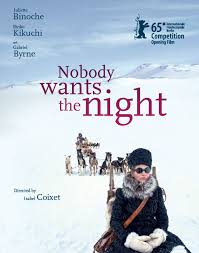
NOBODY WANTS THE NIGHT
Spain, 2014, 119 minutes, Colour.
Juliette Binoche, Rinko Kikuchi, Gabriel Byrne.
Directed by Isabel Coixet.
Nobody Wants the Night is an odd title for this film, not really indicating what the film is about, even though the darkest night of the Arctic is significant for the plot.
Captain Robert Peary had great ambitions to reach the North Pole, going on many expeditions, sometimes accompanied by his wife, Josephine. This film focuses on Josephine herself, a New York socialite, a woman used to comfort yet happy to go on rugged expeditions, are stubborn and dominant woman, commanding and pressurising all those who worked for the expeditions.
Juliette Binoche plays Josephine. It is a role that requires her to be haughty at the beginning, to participate in the ruggedness of the travelling through the Arctic ice and snow, determined to reach the rendezvous with her husband, no matter what the storms, avalanches, injuries and deaths.
However, when she arrives, her husband is not there. There is a young Inuit woman whom she discovers had a relationship with her husband and is pregnant. She is devastated but has to survive with the young woman, especially as the Arctic darkness comes on. There is not much food to be had, Josephine becoming ill, the young woman being pregnant. It is a transforming experience for Josephine who has to let go of her presuppositions, her sense of power and importance, her sense of superiority over the Inuits, and become much more human.
Rinko Kikuchi, the Japanese actress who appeared in such films as Babel, is the young Inuit woman. There is a guest role for Gabriel Byrne as a philosophising, atheistic, lover of solitude who accompanies the expedition.
There is some interesting information at the end of the film, that Peary’s claim to have reached the North Pole first was disputed, that a doctor claimed the honour, but that afterwards, it seems that both claims were not verified. Josephine Peary returned to New York, wrote a number of books and lived until 1955.
The film was directed by Isabel Coixet, a veteran of a rather wide range of films, My Life without Me, The Secret Life of Words, Map of the Sounds of Tokyo.
1. The impact of the film: biography, exploration, endurance, humanity?
2. The use of Norway locations for the Arctic? Snow, the treks, the ice, the avalanches, the storms? Arctic day? Arctic night? The orchestral score? The film based on actual characters, Robert Peary and his expeditions to the North Pole? Josephine accompanying him, her loving him, her motivation, devotion, love of the Arctic?
3. The presence of the Inuits, their home territory, their lifestyle, igloos, food, working as guides? At the behest of the whites?
4. The opening avalanche, Josephine lying on the ground, her formal dress, the screen and the slit, aiming at the bear, the blood, her exhilaration and killing a bear? Indication of Josephine and her spirit? The discussions with the group, her wanting to go on, to rendezvous with her husband? Bram Trevor and his being the guide, warning against? Captain Spalding and his views about sailing? The doctor and his warnings? The meal, the toast – and the number of dead, Trevor and his reminding the group of the Inuits giving their lives?
5. The voice-over, its tone, information, perspective?
6. Josephine, chararacter, referred to as Her Majesty by Trevor? Strong will, determined, stubborn? Her age and experience? Her daughter, left behind and given little thought? Her love and devotion to her husband? The expedition, her range of clothes, the large baggage, the record player?
7. Trevor, a grizzled man, alone, atheist, called mystic because of his views on nature? His relationship with the Inuits? His advice? The experience, the trek, taking photos? The accidents and avalanches, the death of the dogs? His falling into the ice, not wanting a cross, his death? His later appearance in dream to Josephine, a reflection of her own ideas, urging her to go on?
8. The Inuits, the knowledge, their hard work, the dogs, thinking the trek too far, wanting to go home? Ninck and his help, leaving, the news of his death?
9. Arriving at the house? Peary not there? Josephine and her decision to stay, settling in, the others leaving, her comforts, the fire, the music, her clothes? Imperious attitudes?
10. Allaka, Inuit, the English words, her staying, the igloo? Her liki’sng Josephine? Her pregnancy, her story, Peary, waiting for him? Realising Josephine was his wife?
11. Josephine, the realisation, anger, behaviour, in the snow?
12. Allaka and her help, conversation? Calling Josephine Joss? The Western style meal, the wine and its effect? Instruction about cutler…, Josephine and her superior attitude?
13. The two different worlds and belonging to those worlds?
14. Josephine ill, Allaka’s care, recovering? The dogs, providing meat?
15. The gradual breaking down of barriers? Liking each other, depending on each other? The discovery of the pregnancy? The need for heat, burning furniture, Peary’s notes, the beautiful dresses?
16. The storm, smashing the hut, the birth, in the igloo, trapped, battering the roof and getting out? The, prospects?
17. Josephine transformed, her appearance, the difference from Park Avenue?
18. Arrival of a Hanson, news of Peary, his return to the base, the achievement of reaching the North Pole? The rival claim of the doctor? Pressurising
Josephine to go? The death of Allaka and her going into the snow?
19. The final close-up of Josephine’s face, reflecting her experience?
20. Information about Peary and the doctor reaching the pole – or not? Josephine subsequent career, writing, not mentioning this episode to her husband?
Dying in 1956?